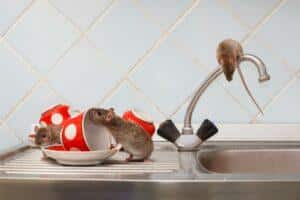Home / Blog / Rodents / Your Rodent Repellent Guide – Tips for Keeping Rats and Mice Away from Electrical Wires
Your Rodent Repellent Guide – Tips for Keeping Rats and Mice Away from Electrical Wires

Scientifically reviewed by Daniel Baldwin, BCE, CCFS, CP-FS
-Published on July 13, 2022
-Updated on March 11, 2025
When faced with frayed, gnawed wires or rodents scurrying around your premises, you are bound to panic. In 2019, 14.8 million Americans reported seeing mice or rats in their homes. If you are a home or business owner dealing with this crisis, you need some practical tips on how to get rid of these pesky pests and prevent them from causing millions of dollars of damage to your electrical systems.
As the saying goes: to defeat your enemy, you must know your enemy. We’ll start with a rundown on why rodents go after your wires, then follow up with a two-pronged approach — how to deter the pesky critters and your best options for defense when the enemy has already invaded.


Why do rodents chew on wires?
Wiring isn’t an irresistible treat for rats, mice, and squirrels. Need and opportunity are what drive these pests to nibble on them. Rodents’ teeth continuously grow, like our fingernails — but while we can cut our nails, they can only gnaw on things to keep their sharp teeth at a healthy length. Small round wires are perfect for holding while chewing, and we always seem to put them just where vermin like to take shelter. Simply put, we are serving our wires up to them on a silver platter.Rodent-chewed electrical wires pose many dangers
Squirrels, rats, or mice chewing on your wires aren’t just a superficial bother. These damaged wires pose a real threat to you, your house or business, and anyone within them. Rodents can wreak havoc and cause electrical fires by biting on wires. Exposed wires are also dangerous for any kids or pets on the property, plus the health concerns caused by decomposing rodents that have been electrocuted in the walls or hard-to-reach places. A little investment of time and money today will go a long way to keep everyone safe.
8 tips to stop rodents chewing on your electrical wires
So, what can you do to protect your home or business electrical connections from being chewed to shreds? Take a look at some of our best rodent repellent tips for a pest-free property, including preventative, curative, and safety measures.Prevention
Prevention is always better than cure, so stopping rodents from taking shelter in your house or business is the best place to start. There are several things you can do, including:1. Seal it up
Take a walk inside and outside your property, sealing any cracks or openings that can be used as a possible entry point. Remember to check under sinks, behind large appliances, in your basement and attic, and in any other crawl space. Rodents can squeeze their supple bodies through the tiniest of cracks. A mouse can fit through a hole of 1/4 inch (the size of a pen) and a rat in a 1-inch opening (the size of a quarter). While this is time-consuming, it’s well worth it as you’ll be thwarting the rodents’ attempts to enter and improving your property overall. Once identified, fill the holes with spray foam, steel wool, or any other suitable material for your wall type — all readily available from your local hardware store.2. Get trimming
While seeing squirrels in a tree is common, you might be surprised to learn that mice and rats are apt climbers and jumpers too. Having branches over your roof or trees close to your property’s walls provides an aerial access point for common rodents. DIY or engage the services of professional tree cutters to address these unwanted bridges, making sure to leave a safe distance of at least six feet between the building and any foliage. As a bonus, this keeps your greenery looking good!3. Hire the pest control pros
Top-quality professional pest control companies offer outside services designed to prevent rodents from entering your property in the first place. At Hawx Pest Control, you’ll find tailored services for any budget and requirement. Our external rodent-repellent barriers successfully keep pests away from your property and its electrical wires.4. Cover it up
Depending on your setup, you might be able to install some rodent-resistant cable sleeves over exposed and at-risk wiring. These sleeves are made from metals, like tin and steel, and add an extra layer of protection to prevent squirrels, rats, and mice from chewing on your wires.Treatment
While the first four tips help keep common rodents away from your electrical wiring, it’s time to take action if they have already sunk their teeth into your cables.5. Set a trap
If you are not afraid to get your hands dirty and have become aware of the problem early, you can try to address the situation by setting some traps. First, identify which rodents have invaded your property and then use traps to bait them. Choosing the right food for bait and the correct placement by the walls and in concealed areas are two of the main things to keep in mind if you are trying to trap mice and rats yourself. To be effective, this tip must be used in conjunction with the other preventative measures in this article. Otherwise, you might successfully eliminate the critters currently dwelling on your property, only to face a second invasion. In fact, mice can leave behind a pheromone trail active for several weeks and guide other pests on this trail. You can only successfully rid yourself of their presence if you eliminate them at their origin.6. Trust the pest control experts
The best way to fight a rodent invasion for good is to call in the professionals. Pest infestations are swiftly resolved with specific services for both homes and commercial properties. Trained and experienced professionals will identify long-term solutions and effectively thwart re-entering, saving you money and headaches in the long run.Safety
While enacting these tips, don’t forget to put your safety first. Our last two points are important safety suggestions and best practices for repelling mice and rats.7. Keep it clean
Rats and mice are particularly well-known for harboring many nasty diseases and passing them on to humans. While rodent droppings are easier to see and avoid, it can be harder to know if pests have taken a bite out of some food left on the counter, shed their fur on your property, or where they have urinated. You will discourage rodent infestations and safeguard your wellbeing by always maintaining a tidy kitchen environment, properly storing your food, and disposing of your garbage in a bin with a tight-fitting lid.
8. Sparks are flying
If you have seen rodents inside your property, noticed flickering lights or power, heard scratching behind your walls, discovered damage to your home appliances, or have any other suspicion that your electrical wiring might be under siege, call in an electrician to take a look. From assessing any wiring damage to advising on repairing and protecting your electrical systems, you’ll be able to sleep better at night knowing your premises are safe.Take action today for a rodent-free home or business
Whether you opt for a DIY approach or have decided to turn to pest control professionals, don’t delay getting on top of your rodent problem. Mice deterrent measures and other pest control practices are fundamental for the maintenance of your electrical systems, the structural integrity of your home or business, and the protection of its contents and inhabitants. Don’t suffer from rodent-caused damage — stop them in their tracks with our effective tips.Related Articles
Visit our blog to learn more.
→



